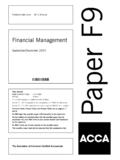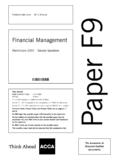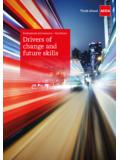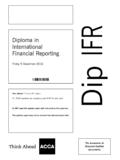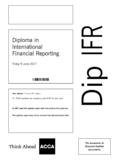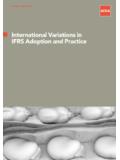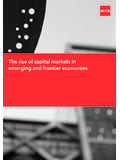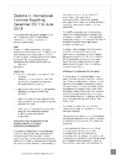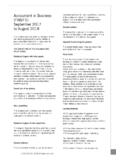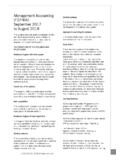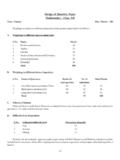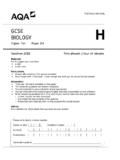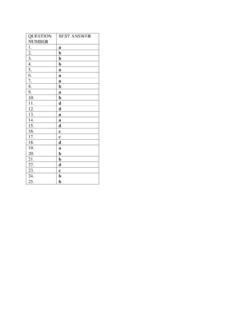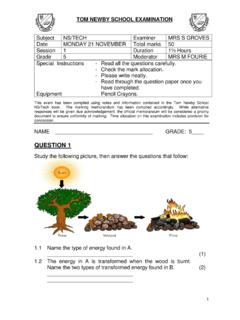Transcription of Paper P1 - Home | ACCA Global
1 Professional Level Essentials ModuleTime allowedReading and planning: 15 minutesWriting:3 hoursThis Paper is divided into two sections:Section A This ONE question is compulsory and MUST be attemptedSection B TWO questions ONLY to be attemptedDo NOT open this Paper until instructed by the reading and planning time only the question Paper may be annotated. You must NOT write in your answer booklet untilinstructed by the question Paper must not be removed from the examination P1 Governance, Risk and EthicsWednesday 12 June 2013 The Association of Chartered Certified AccountantsThis is a blank question Paper begins on page A This ONE question is compulsory and MUST be attempted1A report was recently published by an international accounting organisation on the future of certain rare chemicalsused in industrial processes.
2 The report said that some of these chemicals, crucial to many industrial processes, werenow so scarce that there was a threat to supply chains for items such as computer circuitry and the rechargeablebatteries used in electronic goods. One of these scarce and rare chemicals, the highly toxic trans-Y13 (TY13), hasbecome increasingly rare and, therefore, very expensive. It requires careful processing and, although used in smallquantities in each product, its high cost means that even small inefficiencies in its treatment can disproportionatelyaffect final product report s conclusions included this statement: Put simply, we are living beyond the planet s means. Businessesthat use these materials will experience new risks.
3 It may even become seen as socially unacceptable to use some ofthese materials. Finally, if supply stops, then manufacturing stops. One company which depends on a continuous and reliable supply of TY13 is Hoppo Company. Hoppo is a listedcompany based in the highly developed country of Essland. It has, for several years, designed and developed itsproducts in Essland and then outsourced manufacturing to another company, Red Co, which is based in thedeveloping country of Teeland. This means that Red Co manufactures Hoppo s products for an agreed price and toHoppo s designs and technical Red Co is based in Teeland (a developing country with lower land and labour costs than Essland), workingwith Red Co has offered Hoppo cost advantages over manufacturing its products in its home country.
4 As a companywhich outsources many of its functions, Hoppo tries to ensure that in each case of outsourcing, working conditionsand environmental responsibility are the same at each outsourcing company as they would be if carried out in itshighly-regulated home country of itself is one of the most valuable companies on the Essland stock exchange and has strategically positioneditself as a company that is seen as a trustworthy and responsible producer, that is also responsible in its social andenvironmental behaviour. In its press statements and annual reports, it has frequently highlighted the high value itplaces on integrity and transparency as fundamental values in its corporate governance. It has recently consideredproducing an annual environmental report, as it believes its shareholders would value the information it Co is an experienced producer of electronic circuits and has a long history of working with TY13.
5 It hasrelationships with the main TY13 suppliers going back many years, and these relationships ensure that it can normallyobtain supplies even during periods when world supply is short. Because the supply quality of TY13 varies widely,Red Co has developed finely-tuned methods of ensuring that the TY13 received is of suitable quality. The performanceof the finished product is very sensitive to the quality of the TY13 and so this pre-production testing is consideredvital. In addition, TY13 s toxicity and high cost mean that other systems are put in place at Red Co to ensure that itis safely stored until needed for manufacture. Earlier this year, however, two issues arose at Red Co which caused Hoppo to reconsider its outsourcing first one was the publication of an international media report showing evidence that, despite Hoppo s claimsabout having the same working conditions at all of its outsourcing clients, labour conditions were unacceptably poorat Red Co.
6 Because labour regulations were less stringent in Teeland, Red Co had been forcing employees to workexcessively long hours without breaks, and other measures that would not have been permitted in Essland. It wasreported that workers were being bullied, and threatened with dismissal if they complained about their second problem was a leakage of unprocessed TY13 from the Red Co factory. Not only was this seen as wastefuland careless, it also poisoned a local river, killing many fish and contaminating local farmland. The community livingnearby said that it would be unable to use the contaminated land for many years and that this would affect local a journalist, Bob Hob, discovered information about these two issues, the media interpreted the story as aproblem for Hoppo, partly because of its reputation as a responsible company.
7 Hoppo s own research had shown thatmany of its customers valued its environmental reputation and that some of its key employees were attracted to Hoppofor the same [ important customers began to associate Hoppo directly with the problems at Red Co, even though it was RedCo which had actually been responsible for the employee issues and also the TY13 leak. Hoppo s share price fellwhen some investors considered the problems to be important enough to undermine future confidence in Hoppo smanagement and brand an effort to protect its reputation in future, Hoppo began to review its outsource arrangement with Red Co. Theboard considered the options for taking manufacturing under its own direct control by building a new factory inanother low-cost country, which would be owned and operated by Hoppo.]
8 It quickly realised that stopping theoutsourcing relationship with Red Co would mean the loss of about 1,000 jobs there and could also raise thelikelihood of legal action by Red Co against Hoppo for loss of contract. As Hoppo s manufacturing contract is sovaluable to Red Co, some people thought it likely that Red Co would sue Hoppo for loss of future earnings, despitethe terms of the contract being legally ambiguous. This lack of clarity in the contract arose because of differences inEssland and Teeland law and as a consequence of poor legal advice that Hoppo received when drawing up thecontract. It was believed that any legal action would be widely reported because of Hoppo s international profile andthat this may result in some unfavourable considering its options for a directly-owned factory, Hoppo s plan was to build a modern and efficient plant with state of the art environmental controls.
9 Yuland was chosen as a suitable country and Hoppo narrowed the choicedown to two possible sites in Yuland for its new factory: Ootown and Aatown. The mayors of both towns wrote toHoppo s chief executive saying that they would welcome any potential investment from Hoppo. In addition, the mayorof Ootown asked for a personal gift (relatively immaterial although not a trivial amount to Hoppo but a large amountof money locally) to facilitate a trouble-free passage of the necessary planning permission for a new Hoppo factory inthe deciding between Ootown and Aatown in Yuland, the general view was that, all other things being equal,Ootown was a better location. But there was some discussion about whether the personal gift requested by the mayorof Ootown was ethical.
10 The board thought that the decision was an important one and so took some time to reflectbefore reaching a decision on whether to continue with Red Co or to build a new factory in either Ootown or become aware that investing in Ootown and paying the money to its mayor was being considered by Hoppo,a member of the chief executive s office staff informed the journalist, Bob Hob, and a story appeared in an Esslandnational newspaper saying, Hoppo considers paying a bribe to get preferred site in Yuland. Bob Hob made remarkschallenging Hoppo s claims about integrity and transparency, and suggested that recent events had shown that it haddemonstrated neither. Public discussion then took place on the internet saying that Hoppo, previously considered ahighly ethical company, had been corrupt and incompetent, both in allowing Red Co to breach employment andenvironmental best practice, and then to consider paying a bribe to the mayor of was decided that, in seeking to restore its reputation, the company needed to publish a detailed press statementresponding to the issues raised in the media.
